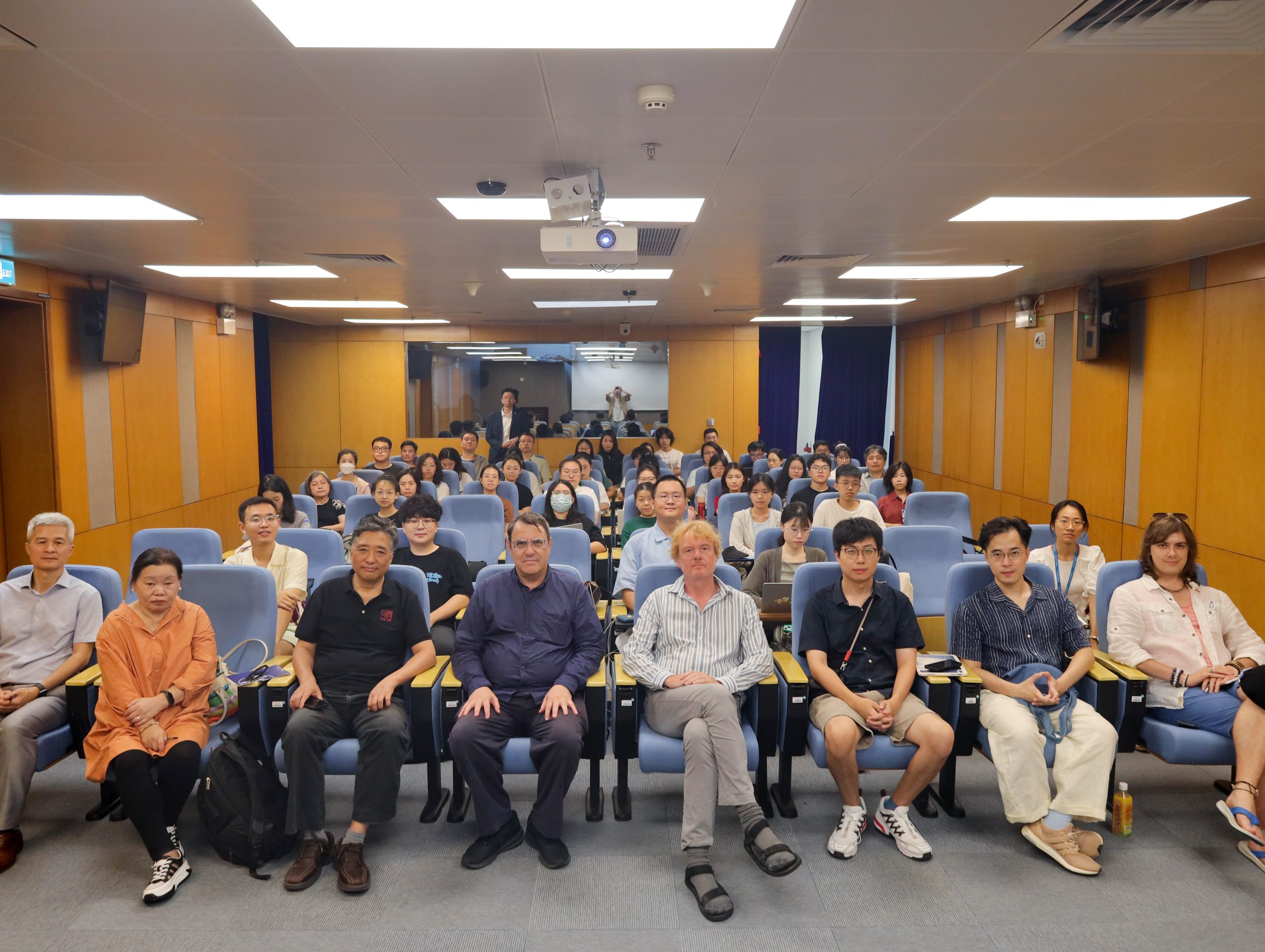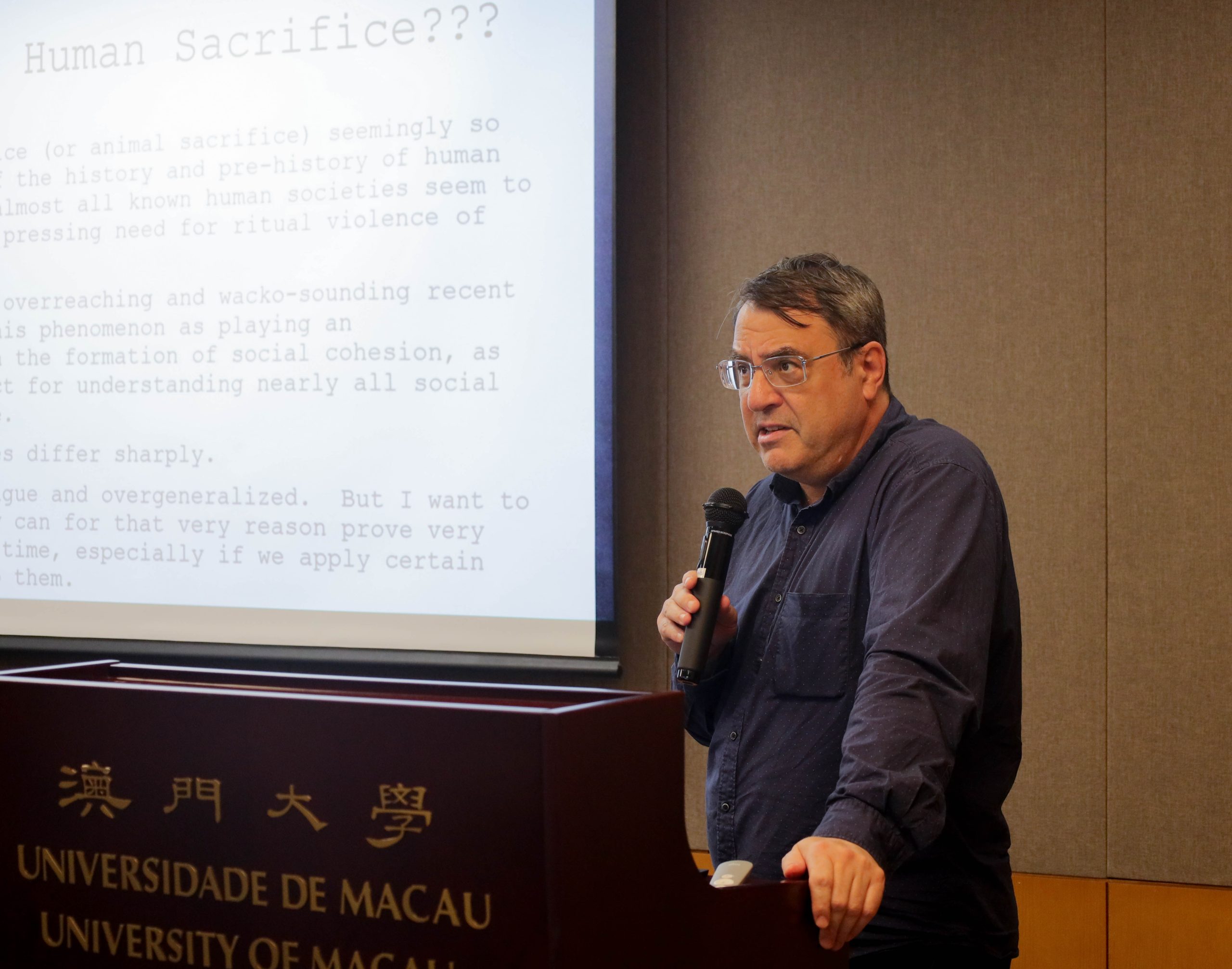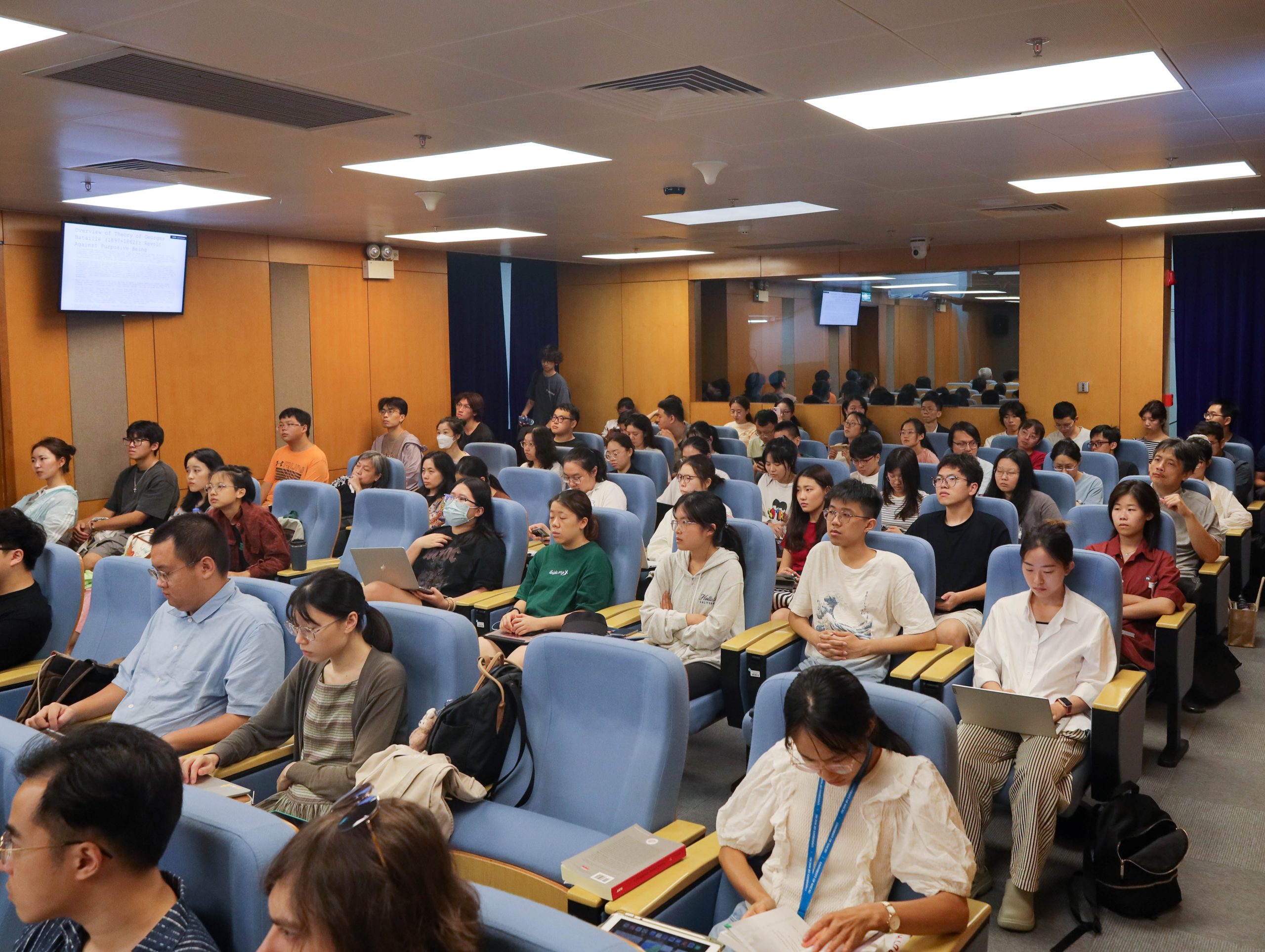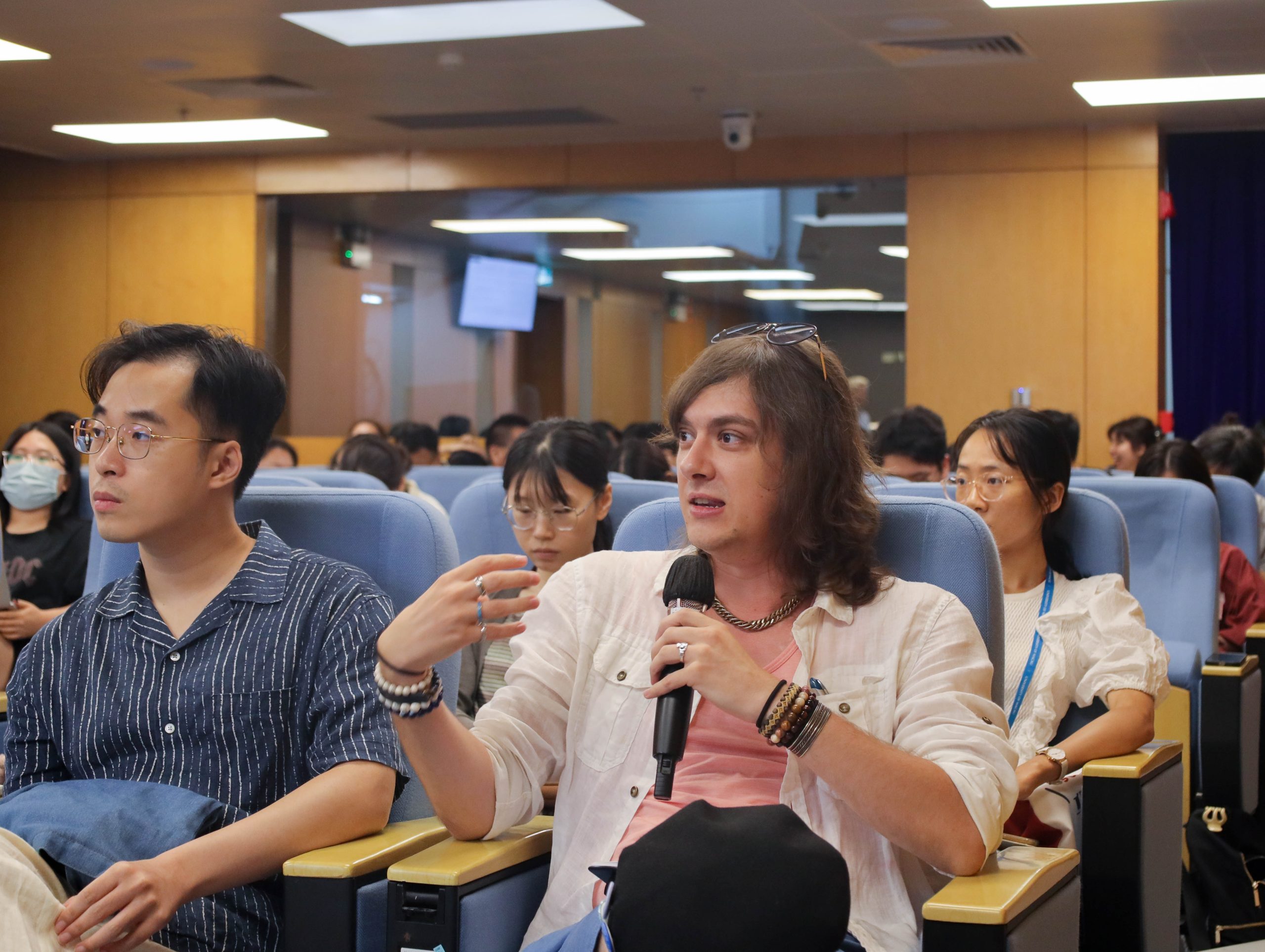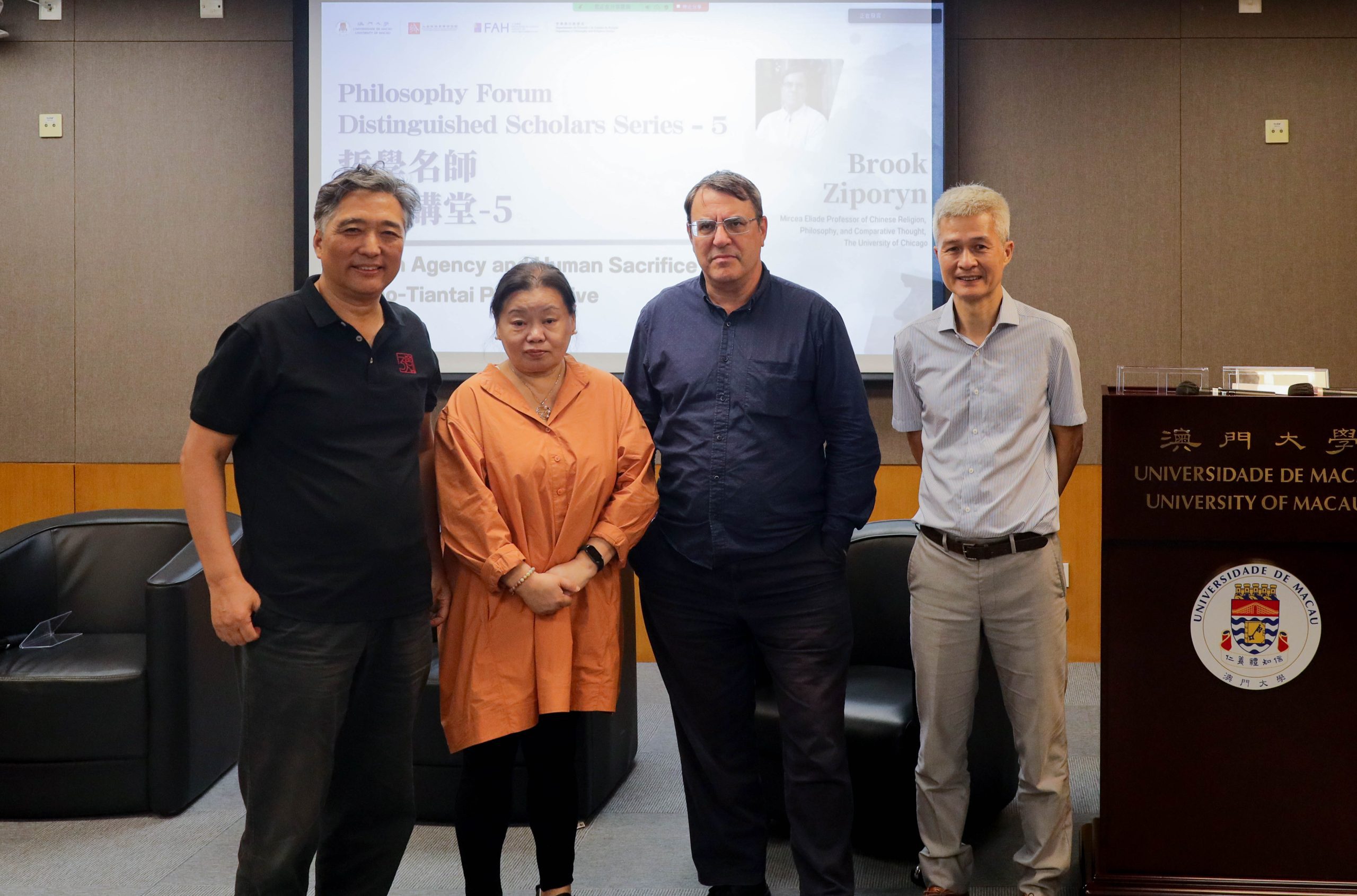【IAS&FAH-DPHIL】The Philosophy Forum Distinguished Scholars Series – 5 was successfully held
【高研院&人文學院哲學與宗教學系】哲學名師系列講堂 – 5成功舉行

2024年8月29日,由人文社科高等研究院(IAS)和澳門大學人文學院(FAH)哲學與宗教學系共同舉辦的哲學名師系列講堂第五講在澳大展館演講廳成功舉行。此次講座主題為「人的能動性與人的犧牲:新天臺視角」,來自芝加哥大學的任博克(Brook Ziporyn)教授擔任主講人,人文學院哲學與宗教學系張穎教授和Hans-Georg Moeller教授擔任與談人,高研院學術項目與刊物主任、人文學院歷史系特聘教授林少陽教授擔任主持人。
任博克教授首先提出了為什麼人類祭祀在人類歷史和史前時期如此重要的問題,並引入了兩種理論來解釋這種現象。喬治·巴塔耶的理論強調了人類有序、目標驅動的生活與他們潛在的、更原始的本能之間的鬥爭。他認為宗教和儀式暴力作為一種釋放,通過控制的暴力行為提供了一種臨時的團結感。相比之下,勒內·吉拉爾的理論將人類衝突歸因於模仿欲望——個體複製他人的欲望,引發競爭和暴力。吉拉爾提出,社會通過替罪羊機制來解決這個問題,即讓一個人為社會動盪負責,而他們的犧牲暫時恢復了和平。
任博克教授隨後將新天臺佛教的概念應用於這些理論,介紹了天臺佛教的三諦(空、假、中)並提出理解人類能動性的關鍵在於認識到所有身份固有的多樣性和相互依存性。他使用莫比烏斯帶作為隱喻,來說明身份如何在局部上是連貫的,而在全域上是不連貫的,以及這種相互作用如何導致人類能動性的複雜性。講座最後呼籲擁抱存在的二元性,並認識到我們的欲望和行為的虛幻本質。任博克教授提出通過普遍化痛苦和妄想,我們可以實現佛性,這是痛苦的終極終結和真正清晰的開始。
在討論環節中, Hans-Georg Moeller教授分享了對於愉悅和厭惡之間複雜關係的看法,張穎教授則對模糊性在宗教和神學背景下的作用以及技術對社會的影響展開了探討,任博克教授也就佛教對邪惡的看法這一問題進行了分享。
此次活動吸引了學者和學生的廣泛參與,引發了關於儀式和暴力在人類文化中的作用以及佛教哲學可能為這些問題提供新見解的熱烈討論。
The Philosophy Forum Distinguished Scholars Series 5, co-organized by the Institute of Advanced Studies in Humanities and Social Sciences (IAS) and the Department of Philosophy and Religious Studies of the Faculty of Arts and Humanities (FAH), was successfully held on August 29, 2024, at the UM Gallery Auditorium. The lecture, titled ‘Human Agency and Human Sacrifice: A Neo-Tiantai Perspective’ featured Professor Brook Ziporyn from the University of Chicago as the speaker, Professor Ellen Zhang and Professor Hans-Georg Moeller from the Department of Philosophy and Religious Studies, FAH, as the discussants, and Professor Shaoyang Lin, Head of Academic Program and Publication of IAS and a Distinguished Professor of the Department of History, FAH, as the moderator.
Prof. Ziporyn began by questioning the significance of human sacrifice throughout most of human history and pre-history, and introduced two theories to explain this phenomenon. Georges Bataille’s theory emphasizes the struggle between humans’ structured, purpose-driven lives and their underlying, more primal instincts. He believes that religion and ritual violence act as a release, providing a temporary sense of unity through controlled expressions of violence. René Girard’s theory, in contrast, attributes human conflict to mimetic desire—where individuals copy others’ wants, sparking competition and violence. Girard proposes that societies resolve this through the scapegoat mechanism, where a single person is made responsible for social unrest, and their sacrifice temporarily restores peace.
Prof. Ziporyn then applied Neo-Tiantai Buddhist concepts to these theories, introducing the Tiantai Buddhist concept of the Three Truths (emptiness, provisional positing, and the middle) and suggesting that the key to understanding human agency lies in recognizing the inherent multiplicity and interdependence of all identities. He used the Möbius strip as a metaphor to illustrate how identities can be coherent locally yet incoherent globally, and how this interplay leads to the complex nature of human agency. The lecture concluded with a call to embrace the ambivalence of existence and to recognize the illusory nature of our desires and actions. Prof. Ziporyn proposed that by universalizing suffering and delusion, we can achieve a state of Buddhahood, which is the ultimate end of suffering and the beginning of true clarity.
In the discussion session, Prof. Moeller shared his views on the complex relationship between pleasure and disgust, Prof. Zhang discussed the role of ambiguity in religious and theological contexts and the impact of technology, and Prof. Ziporyn also shared his views on the Buddhist perspective on evil.
The event attracted a wide range of scholars and students, sparking a lively discussion about the role of ritual and violence in human culture and the potential for Buddhist philosophy to provide new insights into these issues.

